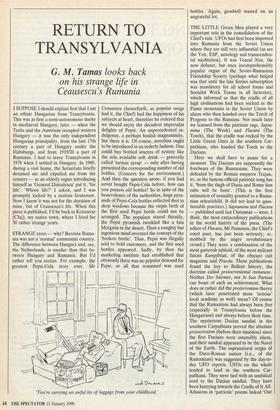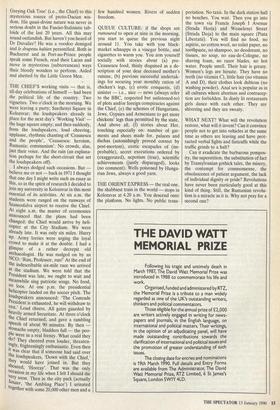RETURN TO TRANSYLVANIA
G. M. Tamas looks back
on his strange life in
Ceausescu's Rumania I SUPPOSE I should explain first that I am an ethnic Hungarian from Transylvania. This was at first a semi-autonomous duchy in mediaeval Hungary, later — when the Turks and the Austrians occupied western Hungary — it was the only independent Hungarian principality, from the late 17th century a part of Hungary under the Habsburgs, and from 1919/20 a part of Rumania. I had to leave Transylvania in 1978 when I settled in Hungary. In 1980, during a visit home, the Securitate briefly detained me and expelled me from the country — as an elderly rogue introducing himself as 'General Dinculescu' put it, 'for life'. 'Whose life?' I asked, and I was promptly kicked by a zealous lieutenant. Now I know it was not for the duration of mine, but of Ceausescu's life. When this piece is published, I'll be back in Kolozsvar (Cluj), my native town, where I lived for 30 rather strange years.
STRANGE years — why? Because Ruma- nia was not a 'normal' communist country. The difference between Hungary and, say, the Netherlands, is smaller than that be- tween Hungary and Rumania. But I'd rather tell you stories. For example, the greatest Pepsi-Cola story ever. Mr Ceausescu (henceforth, as popular usage had it, the Chief) had the happiness of his subjects at heart, therefore he ordered that we should enjoy the decadent imperialist delights of Pepsi. An unprecedented in- dulgence, a perhaps foolish magnanimity, but there it is. Of course, novelties ought to be introduced in an orderly fashion. One could buy bottled sources of ecstasy like the sole available soft drink — generally called 'tarmac syrup' — only after having presented the corresponding number of old bottles. (Concern for the environment.) And then the question arose: if you had never bought Pepsi-Cola before, how can you possess old bottles? So in spite of the benevolence of the authorities, huge pyra- mids of Pepsi-Cola bottles collected dust in shop windows because the virgin birth of the first used Pepsi bottle could not be arranged. The populace stared thirstily, the Pepsi pyramids twinkled like a fata Morgana in the desert. Then a naughty but ingenious mind invented the concept of the `broken bottle'. Thus, Pepsi was illegally sold to bold customers, and the first used bottles appeared. Sadly, by then the marketing institute had established that obviously there was no popular demand for Pepsi, so all that remained was used `You're carrying an awful lot of luggage from your childhood.' bottles. Again, goodwill wasted on an ungrateful lot.
THE LITTLE Green Men played a very important role in the consolidation of the Chief's rule. UFOs had first been imported into Rumania from the Soviet Union where they are still very influential (as are the Yeti, ESP, astrology and transcenden- tal meditation). It was Veacul Nou, the now defunct, but once incomprehensibly popular organ of the Soviet-Rumanian Friendship Society (perhaps what helped was that until the late Sixties subscription was mandatory for all school forms and Socialist Work Teams in all factories), which informed us that the cradle of all high civilisations had been rocked in the Pamir mountains in the Soviet Union by aliens who then handed over the Torch of Progress to the Russians. Not much later we learned from the patriotic rags, Sapta- mina (The Week) and Flacara (The Torch), that the cradle was rocked by the Little Green Ones in the southern Car- pathians, who handed the Torch to the Dacians.
Here we shall have to pause for a moment. The Dacians are supposedly the forebears of the Rumanians. They were defeated by the Roman emperor Trajan, so, as the famous official patriotic song has it, 'from the thigh of Dacia and Rome lion cubs will be born'. (This is the first intimation of sexuality granted to a Ruma- nian schoolchild. It did not lead to ques- tionable practices.) Saptamina and Flacara — published until last Christmas — were, I think, the most extraordinary publications in the world history of the press. (The editor of Flacara, Mr Paunescu, the Chief's court poet, has just been seriously, er, mobbed by the angry revolutionary crowd.) They were a combination of the most gutterish tabloid, of the most militant fascist Kampfblatt, of the obscure cult magazine and Pravda. These publications found the key to Balkan history, the doctrine called protocronismul romanesc. Neither Der Starmer, nor Je Suis Partout can boast of such an achievement. What does or rather did the protocronism theory (which later penetrated more 'serious' local academe as well) mean? Of course that the Rumanians had always been first (especially in Transylvania before the Hungarians) and always before their time. The mysterious Dacian sundial in the southern Carpathians proved the absolute protocronism (before-their-timeness) since the first Dacians were ostensibly aliens, and their sundial appeared to be the Navel of the Earth. The supranatural origin of the Daco-Roman nation (i.e., of the Rumanians) was suggested by the day-to- day UFO reports. UFOs on the whole tended to land in the southern Car- pathians. They were tied with an umbilical cord to the Dacian sundial. They have been hurrying towards the Cradle of It All. Allusions in 'patriotic' poems linked 'Our Greying Oak Tree' (i.e., the Chief) to this mysterious source of proto-Dacian wis- dom. His quasi-divine nature was never in serious doubt in the Fascist-Stalinistic tab- loids of the last 20 years. All this may sound outlandish. But haven't you heard of Dr Duvalier? He was a voodoo demigod and le drapeau harden personified. Both in Bucharest and in Port-au-Prince people speak some French, read their Lacan and move in mysterious (subterranean) ways their bloody wonders to perform. Aided and abetted by the Little Green Men.
THE CHIEF'S working visits — that is, all-day celebrations of himself — had been the political life of the country. Two vignettes. Two o'clock in the morning. We were leaving a party; Szechenyi Square in Kolozsvar; the loudspeakers already in place for the next day's 'Working Visit' the huge square empty; and then suddenly, from the loudspeakers, loud cheering, applause, rhythmic chanting of 'Ceausescu and the people', 'Ceausescu: heroism, Rumania: communism'. No crowds, alas, just their voice. And the rain (an explana- tion perhaps for the short-circuit that set the loudspeakers off).
I always dodged such occasions. But believe me or not — back in 1971 I thought that one day I might write such an essay as this, so in the spirit of research I decided to Join my university in Kolozsvar in this most essential of its activities. At six a.m. the students were ranged on the runways of Szamosfalva airport to receive the Chief. At eight a.m. the master of ceremonies announced that the plans had been changed: the Chief would arrive by heli- copter at the City Stadium. We were already late. It was only six miles. Hurry UP. Army lorries were urging the loyal crowd to make it at the double. I had a glimpse of a rather decrepit old archaeologist. He was nudged on by an NCO: 'Run, Professor, run!' At the end of the indescribable six-mile race we arrived at the stadium. We were told that the President was late, we ought to wait and meanwhile sing patriotic songs. No food, no loos. At one p.m. the presidential helicopter landed on the soccer pitch. The loudspeakers announced: 'The Comrade President is exhausted, he will withdraw to rest.' Loud cheers. All gates guarded by heavily armed Securitate. At three o'clock the Chief returned, and gave a rambling speech of about 90 minutes. By then stomachs empty, bladders full — the peo- ple were in a real frenzy. What could they Flo? They cheered even louder, threaten- !Ugly, frighteningly enthusiastic. Even then it was clear that if someone had said over the loudspeakers, 'Down with the Chief,' they would have joined in. But they shouted, 'Hooray'. That was the only occasion in my life when I felt I should die very soon. Then in the city park (actually Setater, 'the Ambling Place') I urinated together with some 20,000 other men and a few hundred women. Rivers of sudden freedom.
THE ORIENT EXPRESS — the real one, the shabbiest train in the world — stops in Kolozsvar at 4.20 a.m. You descend onto the platform. No lights. No public trans- QUEUE CULTURE: if the shops are rumoured to open at nine in the morning, you start to queue the previous night around 11. You take with you black- market schnapps in a vinegar bottle, and cigarettes to warm you. You arm yourself socially with stories about (a) pre- . Ceausescu food, thinly disguised as a de- scription of your dear deceased mother's cuisine, (b) previous successful undertak- ings for securing your monthly ration of chicken's legs, (c) erotic conquests, (d) sinister — i.e., nice — news (always refer to the BBC, respected but unlistened-to) of plots and/or foreign conspiracies against the Chief, (e) the schemes of Hungarians, Jews, Gypsies and Armenians to get more chickens' legs than permitted by the state, And above all, (f) stories about Her, touching especially on: number of gar- ments and shoes made for, palaces and dachas (astonishingly proved correct by post-mortem), erotic escapades of (im- probable), secret executions ordered by (exaggerated), nepotism (true), scientific achievements (justly disparaged), looks (no comment). Wells poisoned by Hunga- rian Jews, always a good yarn. portation. No taxis. In the dark station hall no benches. You wait. Then you go into the town via Francis Joseph I Avenue (Strada Horia) and Wesselenyi Street (Strada Doja) to the main square (Piata Libertatii). You will find no food, no aspirin, no cotton wool, no toilet paper, no toothpaste, no shampoo, no deodorant, no tissues, no soap, no eau-de-Cologne, no shaving foam, no razor blades, no hot water. People smell. Their hair is greasy. Women's legs are hirsute. They have no teeth (no vitamin C), little hair (no vitamin A and D), their clothes look dubious (no washing powder). Anal sex is popular as in all cultures where abortion and contracep- tion are forbidden. In dimly lit restaurants girls dance with each other. They are shivering and they are sweaty.
WHAT NEXT? What will the revolution restore, what will it invent? Can it convince people not to get into vehicles at the same time as others are leaving and have prot- racted verbal fights and fisticuffs while the traffic grinds to a halt?
Can it eradicate the barbarous pompos- ity, the superstition, the substitution of fact by Transylvanian gothick tales, the misery, the contempt for commonsense, the obsolescence of patient argument, the lack of individual dignity or pride? Revolutions have never been particularly good at this kind of thing. Still, the Rumanian revolu- tion is a miracle as it is. Why not pray for a second one?











































 Previous page
Previous page